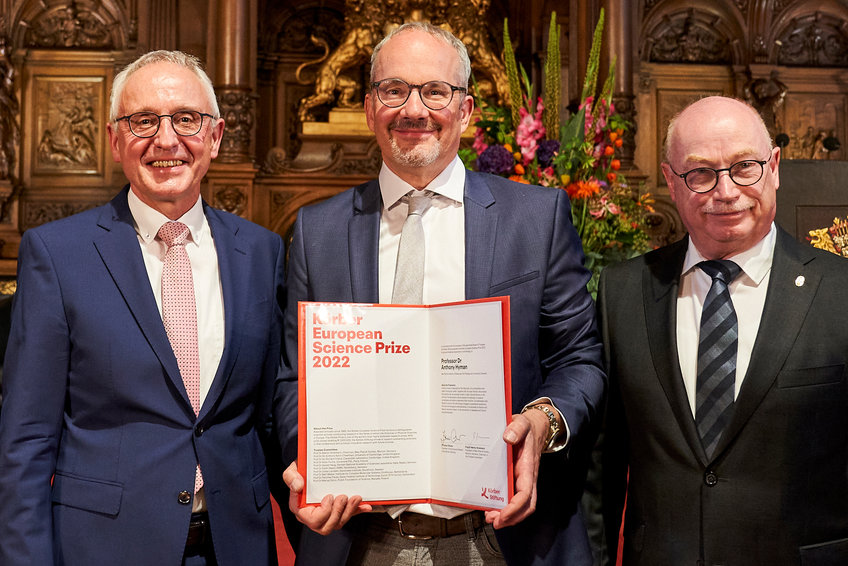Award Ceremony of the Körber Prize for Anthony Hyman
The director of the Max Planck Institute for Molecular Cell Biology and Genetics in Dresden received the Körber Prize in Hamburg's City Hall for the discovery of a completely new state of biological matter
Anthony Hyman has been awarded the Körber Prize for European Science, endowed with one million euros, for his work on research into cell droplets. Martin Stratmann, President of the Max Planck Society, and Lothar Dittmer and Tatjana König from the Executive Board of the Körber Foundation presented the official certificate at a ceremony in the Great Ceremonial Hall of Hamburg City Hall. The Körber Prize, which is endowed with one million, is one of the world's most highly endowed research prizes. In 2009, Hyman and his team discovered – during studies on single-cell embryos of a roundworm – a completely new state of biological matter: proteins can accumulate locally in high concentrations in the cell fluid.

These “condensates” resemble tiny drops, which are subject to the laws of biophysics, amongst other things. Unlike other cell organelles, condensates are not surrounded by a membrane. The very high protein concentration inside them stimulates biochemical reactions that would not be possible outside. Condensates form dynamically, sometimes in a matter of seconds, and are usually also rapidly degraded. When degradation is disrupted –often due to aging – toxic substances can be deposited in affected cells, triggering degenerative diseases such as ALS or Alzheimer's disease. Hyman is now looking for new drugs that could cure these diseases.
Peter Tschentscher, First Mayor of the Free and Hanseatic City of Hamburg, says, “The Körber Prize for European Science has an outstanding international reputation and is one of the most highly endowed science prizes in the world. This year it will be awarded to Professor Anthony Hyman, a scientist who researches at the interface between biology and medicine in Hamburg's partner city Dresden. His scientific work can help to understand the causes of neurodegenerative diseases such as Alzheimer's or amyotrophic lateral sclerosis and to develop effective treatment options for these diseases.”
Cell droplet research
“This year's Körber Prize succeeds in providing a fascinating insight into our most valuable asset – our health. How we can best maintain our health is one of the great challenges facing society, and science has a crucial key role to play in solving it,” said Katharina Fegebank, Hamburg Senator for Science, Research, Equality and Districts. Anthony Hyman's pioneering work in the field of cell biology is one of these scientific impulses that significantly changes entire fields of research and creates new paths. His work impressively demonstrates that research with a spirit of inquiry and interdisciplinary exchange can open up previously unthinkable possibilities.
Anthony Hyman expressed his delight at the prestigious award, saying, “Neurodegeneration remains one of the greatest challenges in human health. Much of the work from my laboratory is focused on using physical chemistry concepts to understand how cellular processes fail in disease. It's a great honor and a real pleasure to be awarded the Körber Prize 2022 to further support these directions.”
The Körber European Science Prize has honored outstanding scientists and scholars working in Europe for their forward-looking research work every year since 1985. Following the award of the Körber Prize, seven laureates have already received the Nobel Prize.
Note: The June 30, 2022 advance notice has been updated to include this version.













